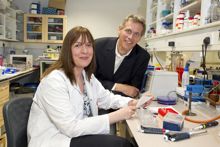2011 Press Releases
20.06.2011
UCC scientists have discovered the genes responsible for efficient colonisation by a probiotic bacterium of the intestine. The research will have applications in the functional food and infant formula industries: the latter is strategically very important for Ireland which produces a fifth of the world’s infant formula. The study is published today in the prestigious journal Proceedings of the National Academy of Sciences USA.
In this research scientists have sequenced the DNA of Bifidobacterium breve UCC2003 and shown for the first time that bifidobacteria produce finger-like appendages called TAD pili that allow them to colonise the gut. The presence of TAD pili in all bifidobacteria suggests a common mechanism for colonisation.
This research, funded by Science Foundation Ireland, is a culmination of several years work by the researchers led by Dr Mary O’Connell-Motherway and Professor Douwe van Sinderen at the Alimentary Pharmabiotic Centre, University College Cork. The scientists have become leaders in the field of functional genomics of probiotic Bifidobacteria.
“The identification of TAD pili is a significant step towards understanding the interaction between bifidobacteria and their host and how the microbiota influences gastrointestinal health” said Professor Fergus Shanahan, Professor and Chairman of the department of Medicine and Director of the Alimentary Pharmabiotic Centre, University College Cork.
Probiotics are live microbes which, when ingested, have a beneficial effect on the host. They have been shown to protect against infection, inflammation and atopic disease, and they can be delivered as capsules or in foods. Bifidobacterium breve UCC2003 is a bifidobacterium which was isolated from the stool of a newborn.
Bifidobacteria are among the first colonisers of the sterile gastrointestinal tract of newborns and are numerically dominant in the gut of healthy breast-fed infants until weaning. Colonisation of the newborn gut by microbes is believed to play an essential role in metabolism, in resisting pathogen colonisation, in the maturation of the intestine and in education of the immune system.
The perceived health benefits of bifidobacteria have led to their widespread incorporation in infant food formulations and other health-promoting probiotic foods. Despite commercial and scientific interests fundamental knowledge is still scarce regarding the exact molecular mechanisms by which bifidobacteria contribute to host health and well-being. This scientific knowledge is essential to scientifically explain the purported health benefits, and support the inclusion of such bacteria as probiotics in functional foods.
Picture: Dr Mary O’Connell-Motherway and Professor Douwe van Sinderen at the Alimentary Pharmabiotic Centre, UCC

